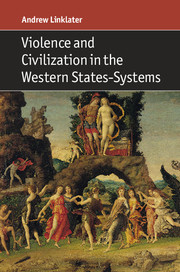Book contents
- Frontmatter
- Epigraph
- Contents
- Preface and Acknowledgements
- Introduction
- 1 The Hellenic City-States System
- 2 New Territorial Concentrations of Power in Antiquity
- 3 The International Relations of Latin Christendom
- 4 The Renaissance City-State System
- 5 The European States-System and the Idea of Civilization
- 6 Cruelty and Compassion in the Age of Empire
- 7 Enlightenment Thought and Global Civilization
- 8 Total Warfare and Decivilizing Processes
- 9 Modernity, Civilization and the Holocaust
- 10 Sovereignty, Citizenship and Humanity in the Global Civilizing Process
- 11 Process Sociology, Civilization and International Society
- Conclusion
- Bibliography
- Index
8 - Total Warfare and Decivilizing Processes
Published online by Cambridge University Press: 28 March 2017
- Frontmatter
- Epigraph
- Contents
- Preface and Acknowledgements
- Introduction
- 1 The Hellenic City-States System
- 2 New Territorial Concentrations of Power in Antiquity
- 3 The International Relations of Latin Christendom
- 4 The Renaissance City-State System
- 5 The European States-System and the Idea of Civilization
- 6 Cruelty and Compassion in the Age of Empire
- 7 Enlightenment Thought and Global Civilization
- 8 Total Warfare and Decivilizing Processes
- 9 Modernity, Civilization and the Holocaust
- 10 Sovereignty, Citizenship and Humanity in the Global Civilizing Process
- 11 Process Sociology, Civilization and International Society
- Conclusion
- Bibliography
- Index
Summary
It is true that people no longer hunt each other for food. Cannibalism, as well as slavery, has become rarer. But the way in which people maim, kill and torture each other in the course of their power struggles, their wars, revolutions and other violent conflicts, is different mainly in terms of the techniques used and the numbers of people concerned.
(Elias 2007: 175)Kant's vision of perpetual peace was the high point of Enlightenment cosmopolitanism. It anticipated a world in which states display unusually high levels of self-restraint, guided by universal moral principles that attuned them to the realities of the closer interweaving of societies. Kant broadly agreed with Condorcet's belief that the species had reached the shores of a great revolution in history. Because of his confidence in the liberating power of scientific elites, Condorcet (1965 [1794]: 53–4) was more optimistic that the present stage of human development promised a future in which ‘all enlightened men, from then on onwards … will be the friends of humanity [and] will work together for its perfection and its happiness’. Kant would not have disagreed with Concordet's hope that, in the future, all peoples would regard war as the greatest of all evils (Hampson 1968: 244). Such visions that located traditional reflections on ‘the good society’ within a more fundamental discussion of the ideal global order represented a significant extension of earlier critiques of the double standard of morality in social and political life. The conviction that the two moralities were problematical or ‘contradictory’ reflected the growing influence of post-aristocratic, bourgeois universalistic norms in European societies. Support increased for the belief that more onerous ethical expectations should apply in the relations between states, that there should be greater accountability to the members of other societies, and that substantially higher levels of self-monitoring and self-restraint should govern the conduct of foreign policy.
Enlightenment cosmopolitanism underpinned the assault on colonialism and slavery, and it informed the critique of a civilization that condemned the cruelty and unrestrained lives of ‘savages’ while despatching thousands to violent death in modern warfare. It represented a radical shift in thinking about the possibilities of a civilizing process that extended beyond national borders.
- Type
- Chapter
- Information
- Violence and Civilization in the Western States-Systems , pp. 306 - 341Publisher: Cambridge University PressPrint publication year: 2017



